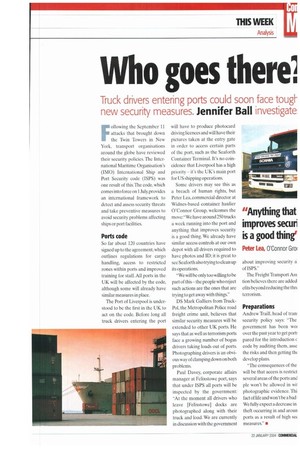Who goes there]
Page 23

If you've noticed an error in this article please click here to report it so we can fix it.
Truck drivers entering ports could soon face tough new security measures. Jennifer Ball investigate
Following the September 11 attacks that brought down the Twin Towers in New York. transport organisations around the globe have reviewed their security policies. The International Maritime Organisation's (IMO) International Ship and Port Security code (ISPS) was one result of this. The code, which comes into force on 1 July, provides an international framework to detect and assess security threats and take preventive measures to avoid security problems affecting ships or port facilities.
Ports code So far about 120 countries have signed up to the agreement, which outlines regulations for cargo handling, access to restricted zones within ports and improved training for staff. All ports in the UK will be affected by the code, although some will already have similar measures in place.
The Port of Liverpool is understood to be the first in the UK to act on the code. Before long all truck drivers entering the port will have to produce photocard driving licences and will have their pictures taken at the entry gate in order to access certain parts of the port, such as the Seaforth Container Terminal. It's no coincidence that Liverpool has a high priority — it's the UK's main port for US shipping operations.
Some drivers may see this as a breach of human rights, but Peter Lea, commercial director at Widnes-based container haulier O'Connor Group. welcomes the move:"We have around 250 trucks a week running into the port and anything that improves security is a good thing. We already have similar access controls at our own depot with all drivers required to have photos and ID; it is great to see Seaforth also trying to clean up its operations.
"We will be only too willing to be part of this— the people who reject such actions are the ones that are trying to get away with things."
DS Mark Galliers from TruckPol, the Metropolitan Police road freight crime unit, believes that similar security measures will be extended to other UK ports. He says that as well as terrorism ports face a growing number of bogus drivers taking loads out of ports. Photographing drivers is an obvious way of clamping down on both problems.
Paul Davey, corporate affairs manager at Felixstowe port, says that under ISPS all ports will be inspected by the government: "At the moment all drivers who leave [Felixstowe] docks are photographed along with their truck and load. We are currently in discussion with the government about improving security a' of ISPS."
The Freight Transport Ass tion believes there are added efits beyond reducing the thrt terrorism.
Preparations Andrew Trail!, head of trail: security policy says: "The government has been wom over the past year to get porv pared for the introduction c code by auditing them. asse the risks and then getting flu develop plans.
"The consequences of the will be that access is restrict several areas of the ports and ple won't be allowed in wii photographic evidence. Thi fact of life and won't be a bad We fully expect a decrease in theft occurring in and aroun ports as a result of high set measures." •




























































































































































































